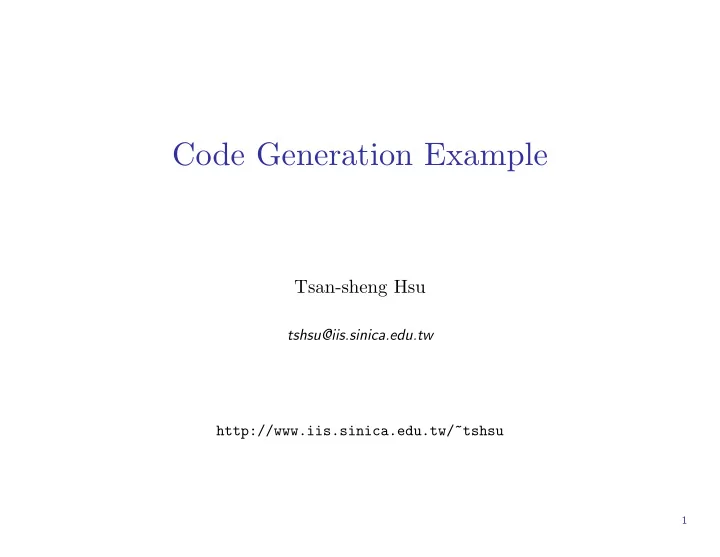

Code Generation Example Tsan-sheng Hsu tshsu@iis.sinica.edu.tw http://www.iis.sinica.edu.tw/~tshsu 1
Warnings This set of slides contain a “pseudo code” for a very simple compiler. • This is an example, not the standard solution. • Assume only integers. • Other solutions exist. This example does not pass LEX, YACC or GCC. Usage of this example is entirely to illustrate the high level ideas. Not responsible for any syntax errors. Please read LEX, YACC and GCC manuals carefully to avoid programming mistakes and conflicts. • web sites ⊲ example: http://dinosaur.compilertools.net/ • libraries • · · · Compiler notes #7-2, 20060606, Tsan-sheng Hsu 2
Error handling char *error_message[MAXMSG]; /* tests for error messages */ void error_msg(int line_no; char * file_name; int index; char *msg1; char *msg2) { switch index { /* some messages needed to be specially treated */ case 3: /* insert *msg1 into error message */ /* variable ‘‘name’’ undefined */ printf("line %d in file %s, error %d, %s\n", line_no,file_name,index,error_message[index]); ... default: if(index >= MAXMSG){ printf("internal error, wrong error index %d\n",index); }else{ printf("line %d in file %s, error %d, %s\n", line_no,file_name,index,error_message[index]); } exit(1);} Compiler notes #7-2, 20060606, Tsan-sheng Hsu 3
Global constants and variables /* tags for where variables are stored */ #define GLOBAL_VAR 1 #define LOCAL_VAR 2 #define TEMP_VAR 3 #define REG_VAR 4 #define PARA_VAR 5 #define NON_LOCAL_VAR 6 #define CONSTANT_VAR 7 ... int global_start; /* the starting address to put global variables */ int local_start; /* the starting address to put local variables */ int temp_start; /* the starting address to put temp variables */ ... Compiler notes #7-2, 20060606, Tsan-sheng Hsu 4
Type definitions typedef struct place_typ { char tag; /* where this var is stored */ int offset; int depth_diff; /* difference in nesting depth */ } PLACE_TYPE; typedef struct var_typ { char type_tag; /* procedure, variable, int constant ... */ PLACE_TYPE place; char *name; /* for a procedure, store the following */ int temp_start,local_start,param_start,...; ... } VAR_TYPE; Compiler notes #7-2, 20060606, Tsan-sheng Hsu 5
Emit (1/2) /* op: operator, opni: operand # i */ void emitASSIGN(char operator; PLACE_TYPE opn1,opn2,opn3) { switch operator { case ’+’: gen_r_address(opn2,3); /* load into register I__3 */ gen_r_address(opn3,4); /* load into register I__4 */ fprintf(code_file,"I__3 = I__3+ I__4;\n"); gen_l_address(opn1,3); break; case ’-’: ... case ’*’: ... case ’/’: ... default: printf("internal error in code generation, operator %c is undefined\n",operator); exit(1); } } Compiler notes #7-2, 20060606, Tsan-sheng Hsu 6
Emit (2/2) void emitCOND_JUMP(...) { ... } void emitIO(...) { ... } void emitCALL(...) { ... } ... Compiler notes #7-2, 20060606, Tsan-sheng Hsu 7
Generate r -address /* load the value at ‘‘where’’ into register # result_r */ void gen_r_address(PLACE_TYPE where; int result_r) { switch where.tag { case GLOBAL_VAR: fprintf(code_file,"I__%1d = AVAL__S(%d);\n", result_r,global_start+where.offset); break; case LOCAL_VAR: /* make sure I__9 is not used for other purposes */ fprintf(code_file,"I__9=I__%1d+%d\n",FP,local_start+where.offset); fprintf(code_file,"I__%1d = AVAL__S(I__9);\n",result_r,); break; case CONSTANT_VAR: fprintf(code_file,"I__%1d = %d;\n",result_r,where.offset); break; ... } } Compiler notes #7-2, 20060606, Tsan-sheng Hsu 8
Generate l -address /* store the value at register # result_r into the place ‘‘where’’ */ void gen_l_address(PLACE_TYPE where; int result_r) { switch where.tag { case GLOBAL_VAR: fprintf(code_file,"ASSET__S(%d,I__%1d);\n", global_start+where.offset,result_r); break; case LOCAL_VAR: /* make sure I__9 is not used for other purposes */ fprintf(code_file,"I__9=I__%1d+%d\n",FP,local_start+where.offset); fprintf(code_file,"ASSET__S(I__9,I__%1d);\n",result_r); break; case TEMP_VAR: ... default: /* internal error */ } } Compiler notes #7-2, 20060606, Tsan-sheng Hsu 9
TEMP space management (1/2) #define MAXTEMP 1000 char temp_map[MAXTEMP]; static int max_temp_used; /* max number of temps used */ void freeALLtemp(void) { int i; max_temp_used = 0; for(i=0;i<MAXTEMP;i++) temp_map[i] = 0; } void freetemp(PLACE_TYPE vplace) { if(vplace.tag == TEMP_VAR){ temp_map[vplace.offset] = 0; } Compiler notes #7-2, 20060606, Tsan-sheng Hsu 10
TEMP space management (2/2) /* very simple first fit allocation algorithm */ int newtemp(void) { int i=0; while(i < MAXTEMP && temp_map[i] > 0) i++; if(i >= MAXTEMP){ /* internal error, allocate more temps */ ... }else{ /* record the max number of temp space used in a procedure if(i > max_temp_used) max_temp_used = i; return(i); } } Use the same bit map technique to record the set of registers used/unused. Check for free register first, then temp space. Compiler notes #7-2, 20060606, Tsan-sheng Hsu 11
Label management static int current_label; /* current label number */ void initLABELS(void) { current_label = 0; } int newLABEL(void) { return(current_label++); } void emitLABEL(int label) { fprintf(code_file,"LAB%d:\n",label); } void emitJUMP(int label) { fprintf(code_file,"goto LAB%d;\n",label); } Compiler notes #7-2, 20060606, Tsan-sheng Hsu 12
YACC rules %union{ int ival; double fval; VAR_TYPE vval; } /* define the return type of ‘‘expr’’ to be VAR_TYPE */ %type <vval> expr ... expr : expr ’+’ expr { $$.place.offset = newtemp(); $$.place.tag = TEMP_VAR; emitASSIGN(’+’,$$.place,$1.place,$2.place); freetemp($1.place); freetemp($2.place); ... } | expr ’-’ expr {...} ... | id {...} ... Compiler notes #7-2, 20060606, Tsan-sheng Hsu 13
Recommend
More recommend